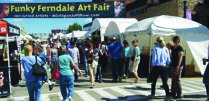The Ups & Downs of Fernlandia… or (In)fernal Oak? of Ferndale-Area Gentrification
By Becky Hammond
GENTRIFICATION SEEMS AN OVERUSED WORD THESE DAYS, AND IT NOW HAS SUCH MULTIPLE MEANINGS THAT IT’S MAYBE BEEN LEFT WITH NONE. But it’s a constant topic, a current running throughout news  stories that seem to be about other subjects. If you’re reading the Free Press or People or listening to NPR, whether the topic is Ford buying the historic depot in SW Detroit or the Brady Bunch house selling, the accompanying multiple meanings that its maybe left with none. But it’s a constant topic, a current running throughout news stories that seem to be about other subjects. If you’re reading the Free Press or People or listening to NPR, whether the topic is Ford buying the historic depot in SW Detroit or the Brady Bunch house selling, the accompanying changes in the communities are an automatic and expected part of the story.
stories that seem to be about other subjects. If you’re reading the Free Press or People or listening to NPR, whether the topic is Ford buying the historic depot in SW Detroit or the Brady Bunch house selling, the accompanying multiple meanings that its maybe left with none. But it’s a constant topic, a current running throughout news stories that seem to be about other subjects. If you’re reading the Free Press or People or listening to NPR, whether the topic is Ford buying the historic depot in SW Detroit or the Brady Bunch house selling, the accompanying changes in the communities are an automatic and expected part of the story.
Ferndale was once called “the new Royal Oak,” with some excitement. Our downtown seemed empty. Royal Oak’s new popularity and higher rents were our gain. Now, “Don’t Royal Oak My Ferndale” is a new catchphrase. It was probably inevitable that Berkley and Clawson’s business districts were doomed to be called ‘New Ferndales,’ and it’s probably just as inevitable that Oak Park’s and Hazel Park’s residential districts seeing home prices shoot up as Ferndale out of reach for many. The changes any city goes through are constant. They have ripple effects.
When is enough enough? How much is too much? And who decides? Peter Werbe, a long-time Oak Park resident, told me, “Most of the Ferndal-ization of Oak Park is occurring on the city’s East Side. Young families and hipsters are taking advantage of the real estate prices that are lower than those in Ferndale and Royal Oak, but it also means that home prices are skyrocketing. Which is good; except the down side, like in all gentrification, is what happens to the poorer people who get displaced?”
Cities and neighborhoods nationwide face these challenges. The Highlands is a funky neighborhood in Louisville, KY, which shouts its indie character. After a visit, I contacted Carmichael’s Bookstore to find out if, given the appeal of what independent people achieved there, developers were in the wings. But the Highlands have been organized and prepared for a long time. “There is an association for businesses called
the Highland Commerce Guild and several neighborhood associations in the area that are very active about growth. There is also a committee one must apply to about any changes to zoning, signage, parking, etc., and most importantly we have a very active Buy Local organization in Louisville.”
There always seems to be a connection between bookstores and neighborhoods with character. Ferndale and Oak Park boast Book Beat, King Books, and The Library Bookstore on 9 Mile. Regarding a feared influx of chains in Ferndale, longtime Library Books owner Martha Sempliner said that chains “. . .destroy every bit of 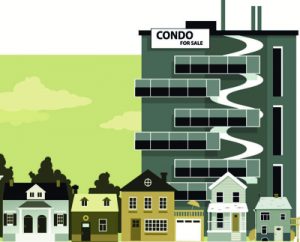 individualism. We get that effort in Ferndale. We have people that will provide it. That gumption, that stick-to-it-iveness impresses me. I don’t want chains that take over individual effort. You can get that anywhere. I want a walkable city where people can go to a number of kinds of businesses that are useful to them. We don’t need a zillion bars.”
individualism. We get that effort in Ferndale. We have people that will provide it. That gumption, that stick-to-it-iveness impresses me. I don’t want chains that take over individual effort. You can get that anywhere. I want a walkable city where people can go to a number of kinds of businesses that are useful to them. We don’t need a zillion bars.”
Ferndale resident Jeannie Davis echoed Martha: “In the ‘70s, Ferndale’s downtown was filled with retail, and moms shopping for kids. The kids moved away, retail dried up, and our downtown was desolate. Because of innovative thinking, we reinvented ourselves, and became a destination for people looking to eat and drink. Suddenly Ferndale was cool, and property prices went up. Now, with the guidance of different innovative leaders, we are changing again. We are greatly expanding our number of places to live. Lots more rentals, and condos. I don’t know if that’s good or bad.
CERTAIN RESIDENTS WANT SOME OF THE CHANGES, not others.
John Hardy said, “Yes, Royal Oak my Ferndale. The East side has no problem with it. Just spend some of the taxes on this side like they should be doing, and not putting new houses and apartments where they absolutely and positively do not belong!
An anonymous semi-newcomer told me, “There are a lot of people my age and younger (20s-to-mid 30s), and probably newer residents and homeowners, who see large building initiatives – which will turn Ferndale into more of an urban area – as ‘progress’ because they want to live in a cool, hip city without living in Detroit. They’re also people who might live here for five or so years before they move to a different suburb for a larger house in an area they perceive as having better schools. They kind of champion investment in a ‘good time’ instead of a ‘long time’, because they want to live in a cool, fun place while they’re young and move their families someplace they perceive as being more family-friendly later on. This seems to be in direct conflict with some people who have lived here longer and raised a family here when it was a sleepier suburb, and want to keep it that way.”
Does Royal Oak enjoy its reputation as the thing to imitate and yet not be? Comparisons abound no matter the city. Oak Park resident Ann-Marie Young said, “I don’t know about this ‘Royal-Oak-my-Oak-Park’ idea. An important distinction between the two cities is this: Oak Park is a community. We know our neighbors. We look out for each other. We celebrate birthdays and create meal trains during difficult times. If a driveway or sidewalk needs shoveling we keep going clearing the path across property lines.”
Vittoria Valenti is just as enthusiastic. “We moved to Oak Park almost a year ago and love it! We lived in Royal Oak previously, and were looking to buy in a city with more of a neighbor-hood vibe. We’re extremely happy with the city services offered and compared to neighboring cities they are exceptional. That said, I’d love to see the vacant store fronts on 9 Mile filled with a diversity of tenants. I’d prefer to spend my money within the city of Oak Park, but right now it’s hard. Royal Oak, Ferndale, or Berkley offer more variety and higher quality options. I’m not particularly interested in a nightlife scene in Oak Park, but affordable, quality restaurants would be a great addition. We don’t need to become mirrors of our neighboring cities, but we should find our niche to remain competitive and relevant. The last thing I think anyone wants to see is people moving into Oak Park for proximity to these other cities and not becoming part of our community.”
John Vavrek: “Oak Park needs a vibrant and attractive downtown area. Connecting to the Ferndale 9 Mile corridor with businesses and restaurants is also not a bad idea.”
SOME CITIES SUCCESSFULLY FOUGHT DEVELOPMENT DECADES AGO, and now are correcting their previous course. Yellow Springs, Ohio is a charming town near Dayton that took warnings about a potentially exploding population in the 1960s seriously. Executive Director Karen Wintrow’s descriptions of no-growth and no-sprawl policies make Yellow Springs sound like a small Vermont. But now a need for more housing density has resulted in a revamping of zoning laws. And successes like a thriving tourist industry give rise to fears that the walkable downtown with businesses residents actually need is leading to too many galleries and gift shops. Experiments like turning an old high school into community space worked until the private owner neglected the building to the point where now it can’t be sold.
Cities like Ferndale have similar concerns and successes. Lakewood, Ohio, is a suburb of Cleveland with a reputation like Ferndale’s. Resident Todd Flenner told me about “…all of the luxury condos going up in our city and who the hell is going to live there? Lakewood has always been a city with funky, cool, old buildings and local businesses. We try to fight the corporate chains opening up, sometimes we win and sometimes we lose. I think the city is still going in a good direction with a few speed bumps along the way. We still remain one of the most diverse cities.”
Diversity is a source of pride in Ferndale, too.

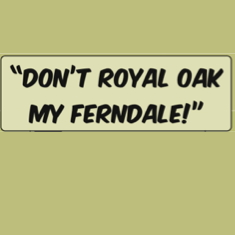
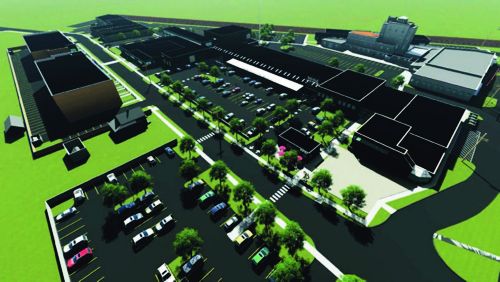
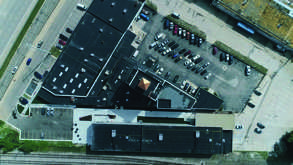 referred to as the Iron Ridge Marketplace. The main marketplace “tower” has some history; originally built as Voigt/Oakman brewery in the late 1930s, it acted as the E-Prize headquarters in the early-mid 2000s before the vacant space was purchased by Iron Ridge Holdings.
referred to as the Iron Ridge Marketplace. The main marketplace “tower” has some history; originally built as Voigt/Oakman brewery in the late 1930s, it acted as the E-Prize headquarters in the early-mid 2000s before the vacant space was purchased by Iron Ridge Holdings.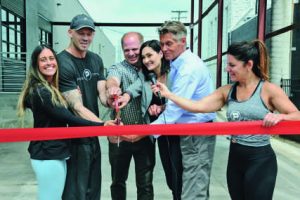 Ridge, and Drifter Coffee hosted pop ups and festivals throughout the spring and summer on the property as they wait for their permanent space to be constructed. Iron Ridge Holdings has held several of their own events too.
Ridge, and Drifter Coffee hosted pop ups and festivals throughout the spring and summer on the property as they wait for their permanent space to be constructed. Iron Ridge Holdings has held several of their own events too.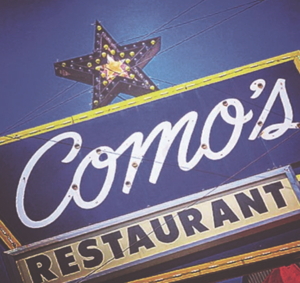
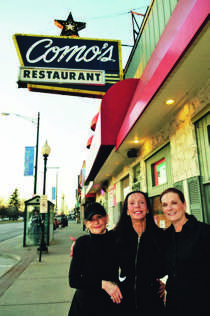
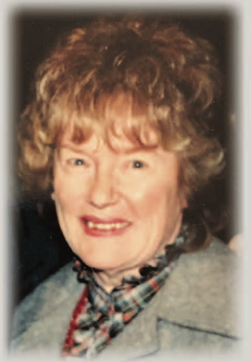
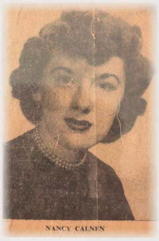 congressional staffer, secretary to a governor, and finally, the position from which she retired, Court Administrator at the 43rd District Court in Madison Heights. She also served as campaign treasurer for a number of political campaigns, and was a long-time member of the Ferndale Library Board.
congressional staffer, secretary to a governor, and finally, the position from which she retired, Court Administrator at the 43rd District Court in Madison Heights. She also served as campaign treasurer for a number of political campaigns, and was a long-time member of the Ferndale Library Board.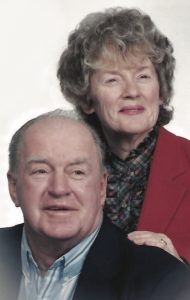 shares her son, Michael Lennon. As she aged, this impatience haunted her. Michael reports that if she called and asked you to do something that you couldn’t do immediately, she would simply attempt to do it herself. “In the last few years and on two separate occasions, this impatience resulted in a TV and then a window air conditioner falling on this woman in her late ’70s who didn’t weigh 100 pounds.”
shares her son, Michael Lennon. As she aged, this impatience haunted her. Michael reports that if she called and asked you to do something that you couldn’t do immediately, she would simply attempt to do it herself. “In the last few years and on two separate occasions, this impatience resulted in a TV and then a window air conditioner falling on this woman in her late ’70s who didn’t weigh 100 pounds.”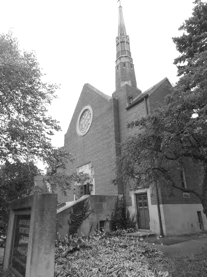
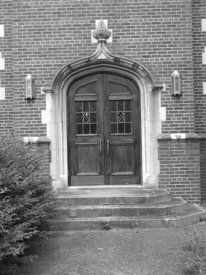 be close to our grandchildren.” Towell described how she and partner Richard Christensen knew they’d be in the neighborhood for many years and immediately started renovating, creating their dream home. “We’ve put a lot into our house, invested a lot,” she said.
be close to our grandchildren.” Towell described how she and partner Richard Christensen knew they’d be in the neighborhood for many years and immediately started renovating, creating their dream home. “We’ve put a lot into our house, invested a lot,” she said.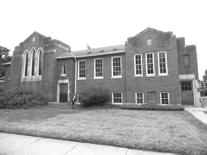 about our property value?
about our property value?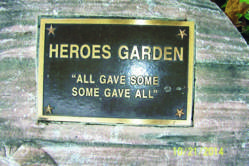
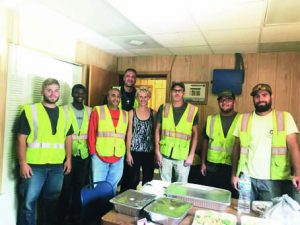 with the garden, she saw its potential and was sad to see it had fallen into disarray. She and Gordon reached out to the community. There were volunteers but more help was needed, so Jackson took it to the City Council. Once she connected to the Council’s Dan Martin she knew help was on the way, but the real moment of joy came when Carlos Kennedy of the Department of Public Works called to tell her they’d designated 10 workers to the project. One of the DPW team lived in the neighborhood and had seen her working in the garden, and mentioned to his co-workers that there was “a lady out there pulling weeds.” They were happy to help.
with the garden, she saw its potential and was sad to see it had fallen into disarray. She and Gordon reached out to the community. There were volunteers but more help was needed, so Jackson took it to the City Council. Once she connected to the Council’s Dan Martin she knew help was on the way, but the real moment of joy came when Carlos Kennedy of the Department of Public Works called to tell her they’d designated 10 workers to the project. One of the DPW team lived in the neighborhood and had seen her working in the garden, and mentioned to his co-workers that there was “a lady out there pulling weeds.” They were happy to help.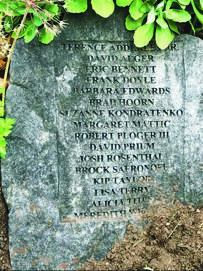 celebrate the work and remember the heroes honored by the words ”All Gave Some, Some Gave All.”
celebrate the work and remember the heroes honored by the words ”All Gave Some, Some Gave All.”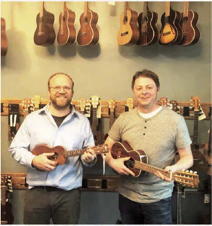
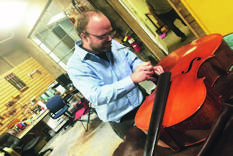 here – I found a passion for it and I never looked back. I started making instruments out of my house 11 years ago, while I was working there.”
here – I found a passion for it and I never looked back. I started making instruments out of my house 11 years ago, while I was working there.” pairs and accessories was growing. Moving to a brick-and-mortar location was natural. And Ferndale was a perfect for them.
pairs and accessories was growing. Moving to a brick-and-mortar location was natural. And Ferndale was a perfect for them.